Sentiment towards Japan has improved significantly of late and there has been a big pickup in overseas flows into the Japanese equity market.
This is on the back of an “extremely strong” relative performance, according to Hawksmoor portfolio manager Ben Mackie.
“Some of that performance has come from multiple expansion”, he acknowledged, meaning that “on a simple price-to-earnings basis, Japan has become more expensive”.
Nonetheless, there is still a lot of value in Japan for investors and active managers who know where to look.
“The headline index valuation has definitely increased and you can no longer say that the overall index is as massively cheap as it used to be. It’s not expensive either, but it has definitely re-rated,” he said.
“You can think about it in terms of the proportion of the Japanese equity market trading on less than 1x book value, for example. Here, there's still a significant proportion of the market that is trading on cheap valuations.”
Performance of sector over 1yr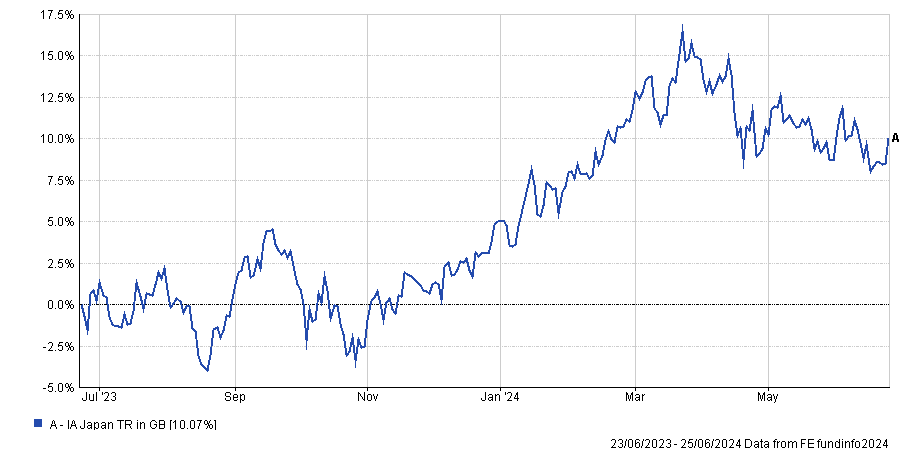
Source: FE Analytics
Mackie believes there are three key theme driving Japan’s equity market recovery: earnings growth, multiple re-rating and the self-help story of improving corporate governance. .Companies are increasing dividends, buying back their own shares and “really thinking about shareholder returns in a different way than they previously did”.
What has happened so far, however, is that a lot of the market leadership has been in the large caps, whereas now valuation dispersion is more interesting further down the market-cap spectrum. Investors can still find “lots of value in the smaller companies area, which is where the dispersion is particularly high”, he pointed out.
For this reason, Mackie and the other co-managers at Hawksmoor have taken some profits from large caps, where the valuation argument “isn't quite as compelling as it was”, to follow the returns down the market-cap spectrum in favour of smaller companies.
Hawksmoor’s exposure to Japan is “very significant”, spanning from 7% in more cautious funds to 12% at the higher end of the risk spectrum. By comparison, the MSCI World index has 5.9% in Japan.
One of Mackie’s favourite vehicles is the Nippon Active Value trust, whose activist approach works particularly well with smaller companies.
Performance of fund against sector and index over 1yr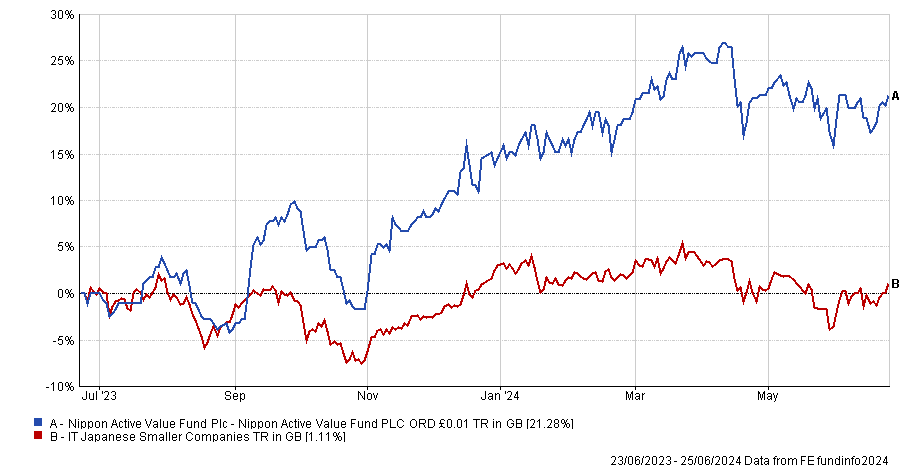
Source: FE Analytics
“The trust is about taking meaningful stakes in smaller companies and then engaging with management to drive change, be that at the operational, strategic or the capital-allocation level,” he explained.
“What is really nice is that it's an idiosyncratic driver of returns, with a portion of businesses being sold and realising lots of shareholder value in a way that is independent of the rest of the market.”
Because the trust’s net asset value (NAV) is only £334.9m, it can't be a massive part of Hawksmoor’s portfolio from a liquidity perspective, Mackie said, although the praised the trust’s efforts to grow its assets by merging with abrdn Japan and Atlantis Japan Growth.
“They've been very active in terms of merging with other struggling Japanese trusts. They have grown the market cap and the liquidity of the vehicle, which is pretty commendable, and have done a very good job with it.,” he said.
To achieve a blend of styles, Mackie is using the FE fundinfo five Crown-rated Arcus Japan fund for more generalist, large-cap exposure.
Performance of fund against sector and index over 1yr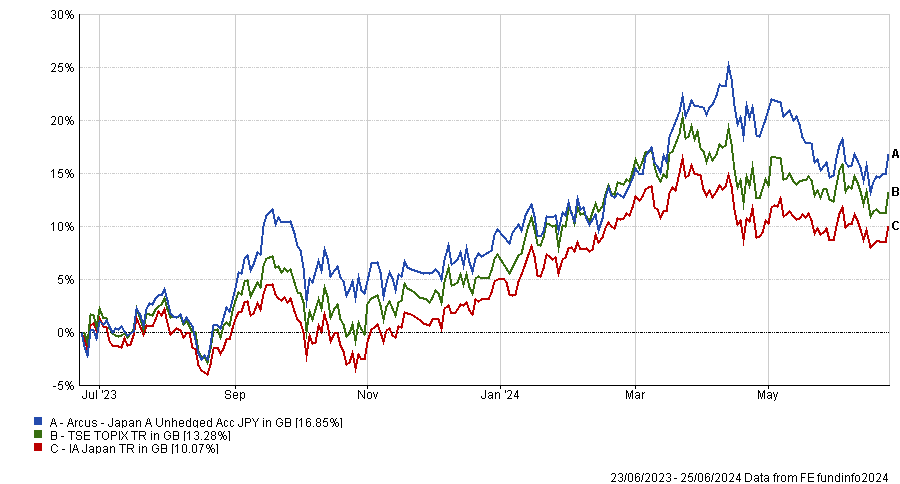
Source: FE Analytics
It is run by FE fundinfo Alpha Manager Mark Pearson, who actively turns the portfolio by selling shares that have re-rated and going back into cheaper areas of the market. Mackie described him as “very much a value manager”.
The vehicle’s top 10 holdings include Panasonic, Rakuten and Mitsubishi and currently, it makes up approximately 1.9% of Hawksmoor’s portfolios.
The next fund is Alpha Manager Carl Vine’s M&G Japan Smaller Companies, in which Hawksmoor has an average 1.7% position.
Performance of fund against sector and index over 1yr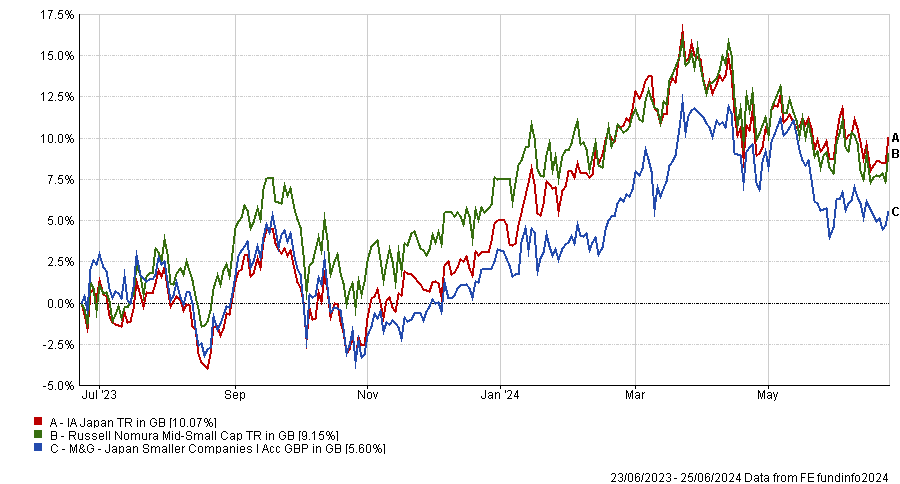
Source: FE Analytics
This is a “more pragmatic and balanced strategy”, that is looking for stock-specific risks to be the main driver of returns.
FE Investments analysts commended the fund’s managers for their in-depth bottom-up process, “which enables them to identify strong opportunities in their 250 stocks universe whilst making proactive and quick investment decisions”.
The fund has a “highly dynamic portfolio, which regularly shifts sector and small-cap exposure relative to its benchmark while exhibiting a slight value tilt and while being a small and mid-cap fund,” the analysts added.
Finally, Hawksmoor also owns Polar Capital Japan Value to re-reinforce the bias to small-caps.
Performance of fund against sector and index over 1yr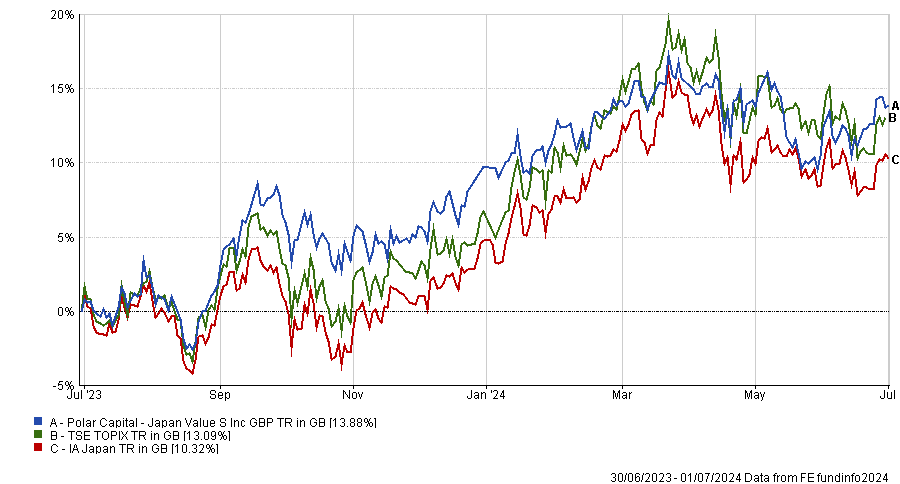
Source: FE Analytics
The fund applies a value-based stock-picking approach, investing in a concentrated portfolio of 40 to 50 large, medium and small capitalisation companies.





